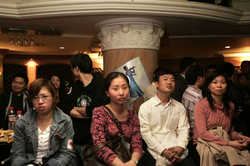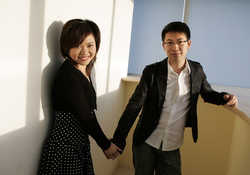When May Yao talks about love, she could be discussing a business plan, not a matter of the heart.
She is 25, attractive, successful -- a graduate from the prestigious Peking University.
She works for a real estate company, owns two apartments -- valued at $260,000 each -- and drives a BMW. Now, she is looking for success in her romantic life, too: She hired Internet "love counselors" to help her find a husband.
"After age 25, you are not as beautiful," she said. "It is like the stock market: You want to sell at the peak."
It's girl-wants-to-meet-boy, modern Chinese-style.
There is a certain drive to couple up -- something akin to the way Chinese young people seek educational and professional perfection. "That's something people in Silicon Valley don't appreciate -- how intense people are here," observed venture capitalist Gary Rieschel, who relocated from California's Silicon Valley to Shanghai and is looking to invest in a dating Web site.
Dating sites are among the hottest new slices of China's emerging Internet market. In a nation where young people have traditionally relied on parents, friends and even professional matchmakers to help find a mate, the Internet is emerging as a great leap forward in the search for Mr. and Ms. Right. Dating sites are blossoming in what could become the greatest matchmaking market known to humankind: China's 130 million (and growing) online users.
"Society is changing very fast," observed Gong Hai Yan, founder and chief executive of love21cn.com, one of China's early dating Web sites. "Young people are moving to the big cities, but they don't have friends and family living there."
The Internet dating and "friend-making" industry in China is forecast to be an $80 million industry by next year, according to Shanghai-based iResearch.
As the Web love markets in the United States and Europe mature with slow-growth forecasts, China's increasingly upwardly mobile young people -- who still face intense parental and societal pressures to get hitched in their 20s or early 30s -- are causing U.S. Internet giants to look East. Foreign investors and companies can't help but be attracted to China's Internet masses, though so far the love has been one-sided as U.S. Internet powerhouses, from Google to Amazon, have struggled to figure out a way to woo Chinese consumers.
"The middle class is emerging in China," observed Diane Wang, co-founder of Joyo.com, which Amazon.com acquired for $75 million in 2004. "They have buying power. It's a market no one can ignore, that's the reality."
And when it comes to love, the Chinese are ardent consumers.
"The Chinese younger generation are more independent," said Aiguo Fan, general secretary of the China Marriage and Family Institute. "They don't rely on their parents as they did before."
Eager May Yao admits she's "very picky." "I want to find a boy who has as good a career as me. But I can't find too many boys like that," she said.
Yao also wants someone with whom she can communicate. She thinks she may have found her match through Baihe.com, which suggests possible dates based on personality tests and, for those willing to pay fees ranging from $480 to nearly $900 a year, offers love counselors to help with the search.
Still, her parents may need to be sold on him: His college does not match hers in prestige. And he left Hewlett-Packard to launch a start-up.
Young people grew suspicious of the first wave of dating sites -- services that offered little more than quick ways to post profiles, which led to numerous stories of sex, lies and disappointment.
Today's leading sites are focused on providing some sort of filters to help people find long-term partners, observed Yun Ma. He is chief executive of eFriendsNet, which includes casual dating service Yeeyoo.com and Meetic.com.cn, aimed at marriage-minded searchers.
Yeeyoo.com borrowed a page from Palo Alto, Calif.-based social networking site Facebook.com -- what Ma jokingly calls his "C to C" business model, or "Copy to China." But then he and other founders worked China Internet hours -- 7 a.m. to midnight, and weekends, too -- devising a relationships Web site that is culturally relevant to China's don't-trust-a-stranger culture. It now has 11 million registered users, garnered $4 million in revenue last year and is profitable. Users of his site, which generates money through ads and by billing customers through their monthly mobile bills, can verify the accuracy of people they meet online through their online web of friends and associates.
His site offers a feature in which members receive a mobile phone text message when someone is interested in their profile, a key service in a culture that is not as e-mail centric as the United States.
Baihe.com, which has $11 million in backing from a handful of Silicon Valley venture capitalists, is relying on its love counselors to attract paying customers. Baihe (pronounced "buy-huh") uses an online banking system to process payments, though co-founder Jason Tian admits it's not ideal because many people don't have access to the system.
Baihe, which means flower lily, the symbol for 100 years of a good marriage, has about 8 million registered users. The Web site markets itself particularly to women, who are more apt to pay for the additional matchmaking help.
In rural China, for every 100 females, there are 117 males, a skewed ratio caused in part by China's one-child policy and the desire of couples to have a boy over a girl. But those female advantages don't play out in the large cities. One reason is that even as women become more educated and professionally successful, tradition still dictates they marry up -- ideal husbands need to have more prestigious resumes and heftier bank accounts -- making their selection even more selective.
And while it is becoming more acceptable for women in cities like Beijing and Shanghai to wait longer to marry (from an average marrying age of 23 during the 1980s to 27 now) they still stampede to get hitched before 30.
"I'm already 26," said Isabel Wang, a fashion magazine editor in Beijing. "In China, 26 means the girl is not young."
Shanghai marketing manager Natalie He, 28, avoids family visits: "I feel lots of pressure from my hometown, my parents and my parents' friends. I went back for the spring festival, and they all said, `When will you bring a boy back to show us?'"
Tian uses this social phenomenon to drive business, showing women a survey of his users in which 65 percent of men want to marry a woman who is 25, while only 26 percent believe age 30 is an acceptable age for a lifelong mate. Likewise, women reject younger men.
Baihe's love counselors help the women hone online profiles, as well as act as dating coaches. The advice can be as simple as telling the guy to send roses. "A lot of our users are shy," Tian said.
China's one-child policy has resulted in a generation of young people who grew up being the center of attention of six adoring adults -- parents and grandparents. So the counselors also help them grapple with basic relationship skills. "They have to learn they can't get everything they want," Tian said.
Though divorce rates in the big cities are now about 50 percent, marriage still confers a certain social standing.
"If a woman is 30 and not married, people will think there is something wrong with her," said Maggie Xie, Baihe.com's financial controller. "In business, a married man is viewed as more reliable."
Baihe.com, like other dating sites, organizes revenue-generating singles events, which include games and other activities. They reflect cultural preferences among Chinese for group gatherings as social icebreakers. Overseas Chinese men, and even foreign-born guys, are big hits; numerous dating sites are looking at developing ways to link their female customers to males living abroad. When foreigners show up to these events, something akin to a feeding frenzy ensues.
The search for blue-chip mates played out on one recent Saturday afternoon, with about 200 showing up to a Baihe.com love connection at a Beijing hotel. As with most of these events, women outnumbered men about 7-to-3. They sat in circles and participated in various games and singalongs before rotating seats. Love counselors were on hand, just in case.
What these events often lack are "A-level" men, guys who fit the hard-and-fast criteria successful women demand, Xie said, looking on. These prime male candidates, she speculated, are more concerned about their careers and are probably working.
The tough scrutiny they'd face may also keep them away.
Tommy Tang, a 34-year-old employee at a security company, described the Beijing dating scene as something akin to emotional bumper cars. "Most of the females leave me after the first date because I don't have a house or a car -- and I'm short," he said.
The experience, though, can be equally blunt and bruising for the women. After several hours of socializing, the event came to a close with the Lineup. Women stood against the walls of the large hotel meeting room. Then the men circled, handing out cards to the ones they'd like to get to know.
Zhao Yuping, 28, left carrying a fistful of Mr. Maybes. Still, she wasn't too pleased with the day's catch.
So a frowning Zhao decided on Plan B -- sending her mother out to Zhongshan Park in central Beijing, where parents parade with pictures of their children, hoping to strike a deal with another parent.
"I plan to ask my mother to go there and help me find someone," Zhao said.
Preferably, she quickly added, a man who owns a house.

Enlarge image

Enlarge image